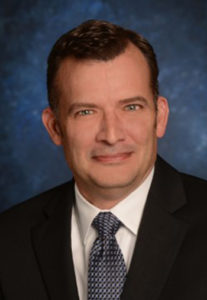Texas Health Resources is one of the largest faith-based, nonprofit health systems in the United States, and the largest in North Texas in terms of patients served. The health system includes Texas Health Physicians Group and hospitals under the banners of Texas Health Presbyterian, Texas Health Arlington Memorial, Texas Health Harris Methodist and Texas Health Huguley. Texas Health has partnered and affiliated with numerous organizations – from all aspects of the healthcare industry – to better serve the more than 7 million residents of North Texas. These relationships, along with other major initiatives and quality programs, are supported by Texas Health’s more than 350 points of access, 23,000 employees and 5,500 physicians with active staff privileges.
 Shaun Clinton
Shaun Clinton
Senior vice president, supply chain management, Texas Health Resources, Arlington, Texas
Shaun Clinton began his career in healthcare in 1994 as an intern writing training manuals at Baxter’s financial shared services organization in Albuquerque, New Mexico. “The funny thing is, I had never heard of Baxter or considered a job in healthcare until I took that role,” he says. “I had been in retail management roles for my short professional life to that point.” But he and his wife moved to New Mexico with his wife’s job, and Clinton decided to take some business classes at the local community college. An instructor suggested he talk to the instructor’s wife – a manager at Baxter – about the role at Baxter. “I became fascinated with the myriad of moving parts in the healthcare supply chain and decided in short order I would make a career of it.” Since then, he has spent time on the distribution, GPO, and provider sides, “and every day I think I learn something new.”
At Texas Health Resources, Clinton leads a team of over 300 people who have responsibility for logistics operations at facilities across North Texas, procurement of over $700 million of supplies and equipment annually, management of an MMIS, courier services, equipment planning, clinical engineering, and a team of strategic sourcing and category management directors.
Journal of Healthcare Contracting: What has been the most challenging and/or rewarding supply-chain-related project in which you have been involved in the past 12-18 months?
Shaun Clinton: A project that has been both challenging and rewarding in the past year is the category management team’s efforts to “codify” the work they do, so we can be very transparent to the entire enterprise about where we are in any given cycle, the stakeholders involved in the decision-making process, and the economic value generated by each project they are working on. This effort began almost three years ago, when we decided to explore building an algorithm describing how we do everything that comes across supply chain’s desk. It starts by asking simple questions – Is it a product? A pharmaceutical? What steps do we take to evaluate it? How do we communicate and operationalize our decision? By building a tool that spells all this out, we can help our customers respect the decision-making process, lend consistency to strategic sourcing, and help bring new people up to speed quickly on our processes. We intend to roll out this tool this summer.
JHC: Please describe a project on which you look forward to working in the next year.
Clinton: We are just beginning a business transformation project that coincides with our migration to Oracle PeopleSoft over the next few years. The team and I are extremely excited to begin to build what a future-state, cutting-edge supply chain organization will look like over the next few years. For me, it comes down to, How are we going to service our customers, and what products will we produce for them so they can do their jobs well and see value? I expect we’ll be working on this for three years, at least.
JHC: In what way(s) have you improved the way you approach your job or profession in the last five to 10 years?
Clinton: This one’s easy: I have learned not to take everything personally! I consider supply chain a calling and not just a career, so it’s sometimes hard to hear negative feedback. But thanks to folks like John Gaida (my former leader at Texas Health) and others like him in the industry, I’ve come to realize that not everything will go perfectly, and if I trust the team around me, I’m doing just fine.
JHC: What do you need/want to do to become a better supply chain executive in the coming year(s)?
Clinton: I’m in the habit of writing down phrases that resonate with me, no matter the context. In the past couple of years two that I’ve written down are “Defer to expertise” and “Make it easy to do the right thing.” The healthcare supply chain is complex, exhilarating, and sometimes maddening. My hope is that in the next few years I can continue to apply these two phrases, and both learn new things and teach others to share the same passion I feel for this part of healthcare.
